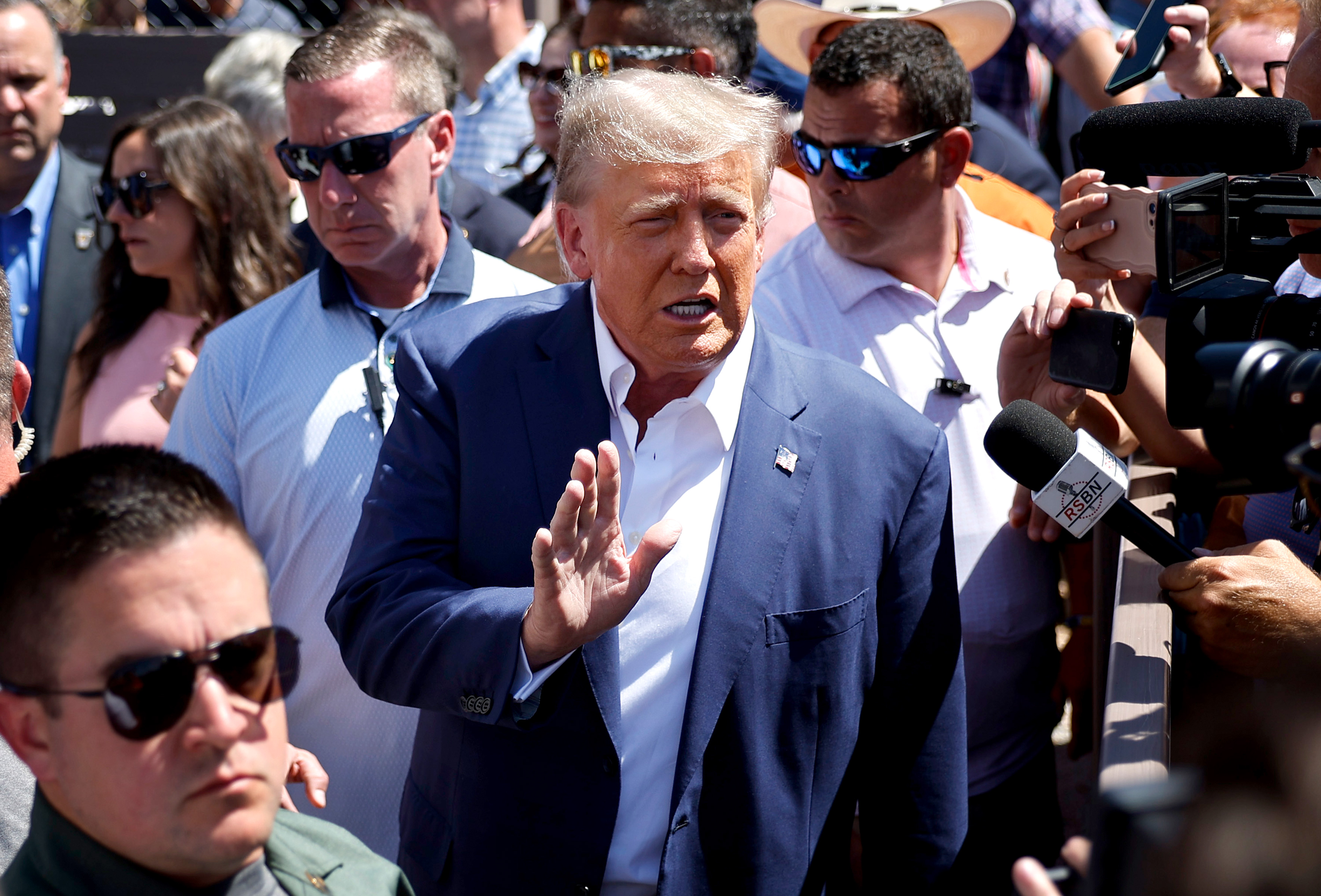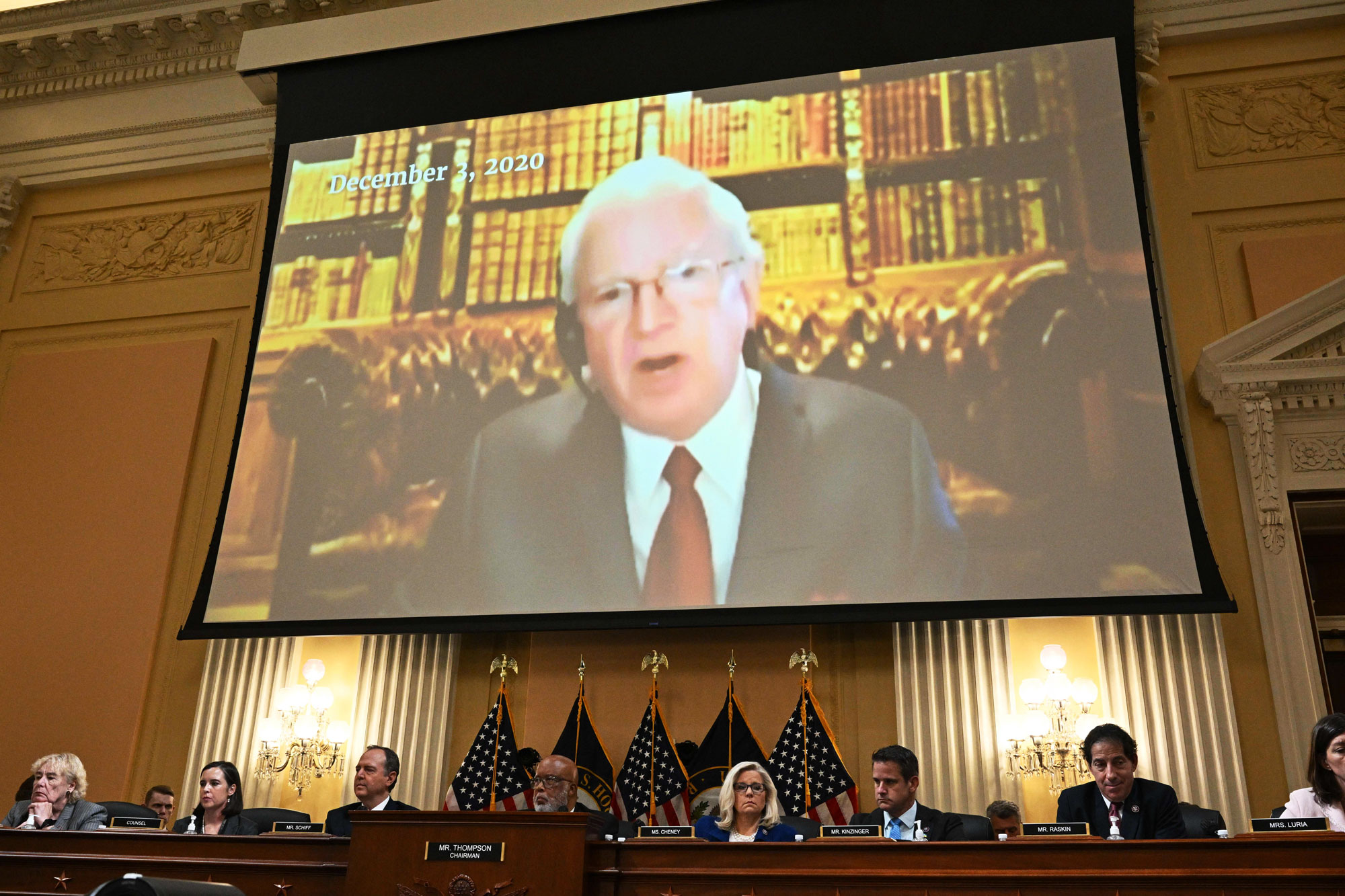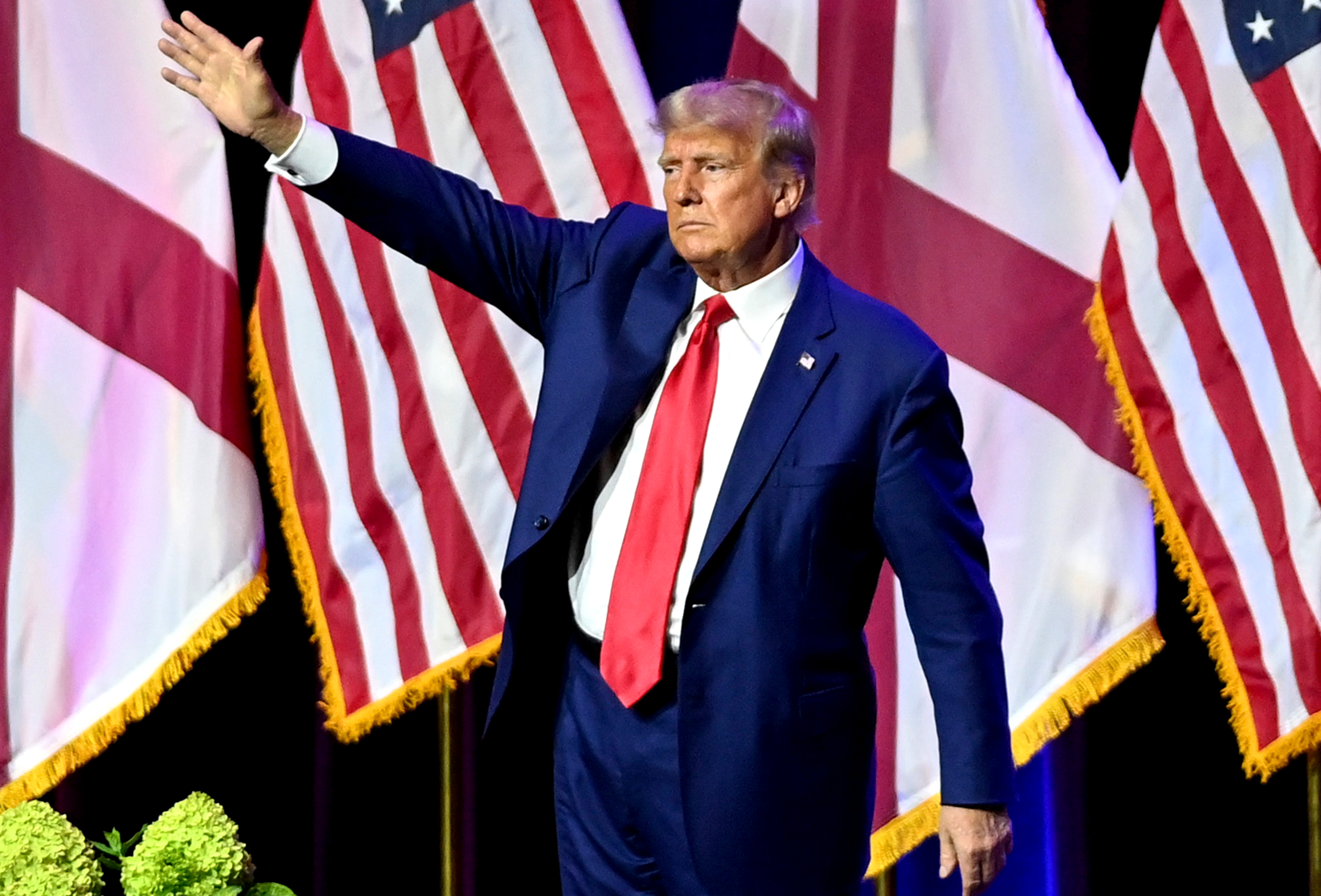A candidate's performance in a presidential debate can make or break a campaign.
Florida Senator Marco Rubio's dressing down at the hands of New Jersey Governor Chris Christie represented the death knell for a once-promising White House bid in 2016. Former Hollywood actor Ronald Reagan's commanding performances at the microphone over the course of the 1980 presidential campaign arguably won him the Republican nomination and, later, the presidency. And in a 1992 debate against Democratic challenger Bill Clinton, then-President George H.W. Bush's decision to check his watch during an audience question about the economy helped cement an image of him as out-of-touch with the concerns of working Americans, rushing him along to a crushing debate in November.
The Republican field of candidates this cycle will inherit an unprecedented and arguably insurmountable challenge as they seek to defeat a two-time nominee in their party, former President Donald Trump, who holds a commanding lead in most national polls. They will also have to do so as the man they seek to beat isn't on the same stage—Trump has already announced he will not participate in any debates this presidential cycle, much to the chagrin of party leadership. But in a race for second place, there is a lot for the prospective candidates to gain, particularly given a front-runner whose campaign war chest is committed to fighting off 91 criminal charges in four different jurisdictions.

Here's what to look for Wednesday night:
DeSantis vs. Ramaswamy
Since his dominating win in his 2022 reelection bid for governor of Florida, Ron DeSantis has been considered the man to beat in a crowded GOP field to replace Trump, once polling nearly neck-and-neck with a man many Republicans consider the face of the modern GOP.
That narrative changed quickly. In several recent polls, DeSantis—once a real contender to unseat Trump at the top of the Republican pecking order—has been struggling to hold his grip on second-place as upstarts like Vivek Ramaswamy and even "Never Trump" candidate Christie have seen a surge in polling among the half of the Republican electorate willing to back someone other than Trump.
DeSantis' own team is aware it has to make a move. In a leaked strategy memo from Axiom Strategies the week before the debate, DeSantis advisers encouraged the governor to "hammer" Ramaswamy during the debate—including on the leak of an extensive opposition file on Ramaswamy attacking his business record and recent policy positions.
Whether DeSantis sticks to that plan is up for debate, particularly as the firm has come under immense scrutiny from the media in recent days. Despite the fact Axiom Strategies executives are intimately connected to the Never Back Down political action committee that backs him, DeSantis has sought to distance himself from the memo, and has downplayed it in public.
"On the memo, it's not mine. I haven't read it," DeSantis said in a brief Fox News interview Saturday. "It's just something that we have and put off to the side."
'Pile on Ron'
The other candidates in the field, meanwhile, smell blood in the water.
After the memo's release, Ramaswamy attacked DeSantis as a career politician, playing up his carefully manicured visage as an outsider that has helped him build a level of momentum few others in the Republican field have been able to replicate. But Ramaswamy—unlike more mainstream figures in the race like former United Nations ambassador Nikki Haley, DeSantis, or even South Carolina Senator Tim Scott—also has something those candidates lack: the ability to criticize his opponents at will. And it's likely that capital will be put to use attacking the man it makes the most sense to attack.
"Haley and DeSantis, they're young, but they've been in politics, and they have brands to protect," Aaron Kall, an expert on presidential debates at the University of Michigan, told Newsweek in an interview. "There's norms and expectations. They've been governors and they're probably going to be a little more conservative in their approaches. But someone like Ramaswamy is really playing with house money."
Others, like Christie, have built their campaigns on their express willingness to attack Trump's record and, in particular, his lack of success as a candidate. Attacking someone who has sought to replicate Trump's "Make America Great Again" movement without Trump, experts said, is likely a natural line of attack. Particularly amid lines in the leaked memo that DeSantis should "defend" Trump from attacks by Christie at the debate.
"The only way to beat someone is to beat them. If [DeSantis] thinks he's gonna get on the stage and defend Donald Trump on Wednesday night, then he should do Donald Trump a favor and do our party a favor, come back to Tallahassee, endorse Donald Trump, and get the hell out of the race," Christie said during a whistle stop in Florida over the weekend.
Splintering on Ukraine
On most aspects of the Republican platform, most candidates are in lockstep with one another. Nearly all have made a comment on wanting to prevent transgender athletes from playing in women's sports. All believe the Biden administration has been a failure. Most, but not all, expressed a willingness to back a federal ban on abortion, though the details vary from candidate to candidate. (More on that later.)
The biggest area of divergence, however, might be the individual candidates' stance on foreign policy amid a growing divergence between Republicans' traditionally hawkish posture on world affairs and a growing anti-interventionist streak among the populist, "America First" strain of conservatism that bloomed under Trump.
While candidates like Haley and former Vice President Mike Pence have been ardent supporters of continued involvement in Ukraine's ongoing effort to repel Russia from their borders, others—like Ramaswamy—have signaled support for plans to appease Russian demands in return for a quick resolution to the conflict.
Others, like DeSantis, have largely sought to avoid confronting questions around their plan to address the conflict.
Ukraine funding is likely going to be the biggest divider between candidates and voters in the Republican primary. According to a Pew Research Center survey from June, roughly four-in-10 Republicans believe the United States is currently providing Ukraine with "too much" aid, while populist thought leaders in the GOP have regularly railed against the amount of money being diverted out of the U.S. to support the war effort. Other polling later in the summer continued to show high support among Republicans.
Nuance on Abortion
Arguably, no issue will come to define the 2024 election more than abortion.
After the overturn of the federal abortion protections established under the 1973 Supreme Court decision Roe v. Wade, Republican candidates for Congress lived and died by their support of strict limitations on abortion rights during the 2022 midterms, helping Democrats avert a significant defeat most political strategists believed was historically inevitable.
Among Republicans, support for a national abortion ban has become something of a litmus test for presidential hopefuls. The key is how strict they believe it should be.
Some, like Pence, have publicly supported a federal ban on abortions after six weeks of pregnancy, and have pushed fellow candidates to support it. Others, like Scott, have followed suit, expressing a willingness to sign whatever abortion ban a presumably Republican-led Congress passed into law. Haley has stressed it should be an issue left to the states to decide.
Who takes on Trump?
The biggest question for those onstage Wednesday night, however, will likely be who isn't on it: Trump, who commands the preference of more than half of the Republican electorate in most major polling nationwide.
While Christie has seen his star rise among his regular critiques of the former president, few others have been willing to mirror his attacks for fear of alienating the Trump-supporting voters they will likely need behind them to win a general election.
However, with most of the field competing for the same share of the Republican vote, candidates will need to find a way to outshine their colleagues as well as undermine the former president's viability if they want to win their party's nomination. With him not on the stage, Republican candidates will need to find a way to make a case against him, rather than defending a man who didn't see fit to join them onstage.
"I think Trump is right to stay out of the debate," David Greenberg, an expert on presidential debates at Rutgers university-New Brunswick, told Newsweek in an interview. "They'll be shadow-boxing. Yes. They will kind of look a little pathetic going after him when he's not there. But they'd have to be going after him if he were there. I mean, that's just the reality. He's the front-runner. They have to go after him. If they don't talk about him, then he can just ignore the whole thing and say 'who cares' about that debate."








